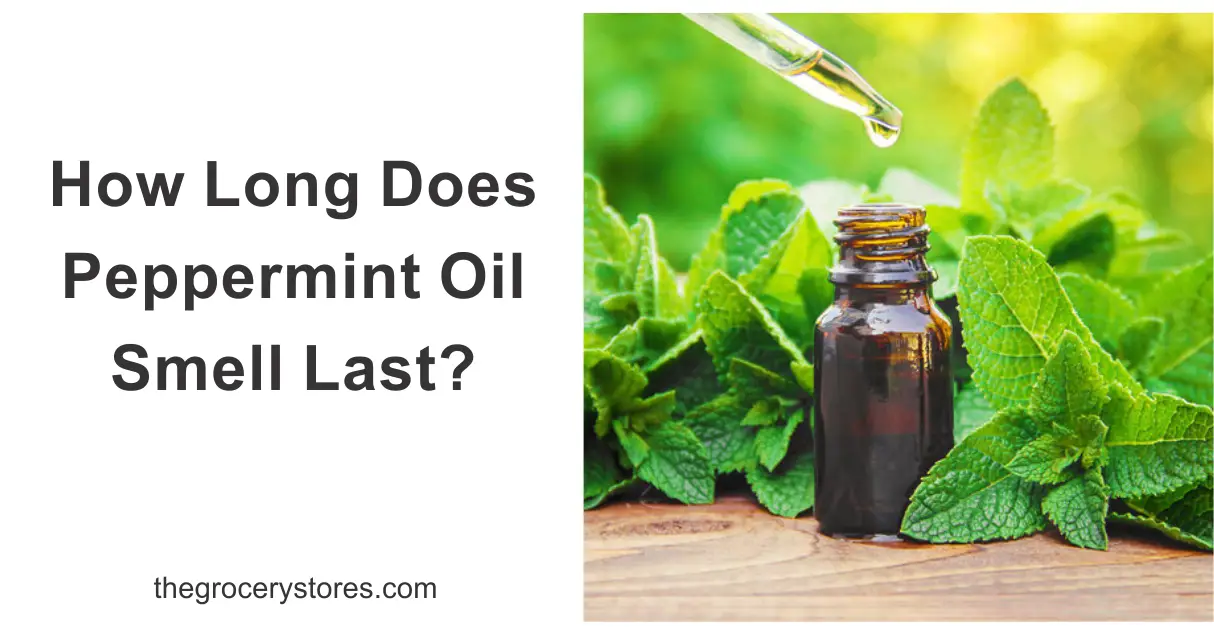Peppermint oil is derived from peppermint plants. Peppermint is an aromatic herb found in the mint family. This peppermint mint is a hybrid mint that crosses between spearmint and water mint, known scientifically as Mentha and Piperita. Peppermint oil is often extracted from the leaves of peppermint plants and can be used for several purposes.
Peppermint is characterized by a very sharp smell with a cool and refreshing taste similar to its smell.
Peppermint does not have a fixed time range as each essential oil will stay in the air for a different amount of time. Top notes like lavender, peppermint, and eucalyptus will evaporate in a time frame of about one to two hours.
Middle notes like geranium, chamomile, and rosemary are likely to evaporate aromatically within two to four hours. And much heavier base notes like ginger, myrrh, and cedar wood may last longer than hours or even days.
Peppermint oils should be used and reapplied when the aroma fades away, which often takes about two weeks more or less before they wear off to maximize their effectiveness. At a minimum, you should replace the peppermint-soaked cotton balls monthly, but when dealing with a recurring problem, it should be done every fortnight.
How long does peppermint oil smell last on cotton balls?
Use of cotton balls while wearing a glove is one of the effective ways peppermint oil is applied in our homes and outdoor spaces to maximize its effectiveness.
With your gloves on, soak your cotton balls in peppermint oil and strategically drop them in holes and entry points in your home and outdoor spaces. They should be changed within a period of about two to four weeks to ensure the aroma stays strong and your home is pest-free.
Is smelling peppermint oil safe?
Essential oils have a strong aroma. They can actually aggravate your skin and increase your swelling if they aren’t utilized correctly.
In order to use essential oils, they must first be diluted with a carrier oil.
Women who are breastfeeding may get relief from pain and damaged skin by applying peppermint oil topically in the form of a gel, water, or lotion to the nipple area. Because it could impair their breathing, infants and tiny children shouldn’t inhale or have peppermint oil applied to their faces.
Asthma symptoms and airway inflammation may possibly be brought on by breathing in the oil-released particles. VOCs, also known as volatile organic compounds, may be present in the potent aromas that essential oils generate. Chemical gases known as VOCs aggravate respiratory irritation and deteriorate air quality.
What happens if you inhale too much peppermint oil?
In general terms, the inhalation of essential oils is not dangerous. However, intense inhaling both in quantity and over a long period of time of more than twenty minutes is likely to lead to respiratory and/or neurological symptoms like headaches, burning eyes and throat, nausea, shortness of breath, and even slow breathing.
Dilution of essential oils is necessary to avoid negative effects. Generally speaking, you should keep essential oil concentrations below 5%.
If you haven’t had advanced training, certification, or are functioning under the supervision of a skilled professional, you shouldn’t take essential oils internally. Avoid ingesting oral medications and applying them inside, including to the vagina or other mucous membranes.
How do I get rid of the smell of peppermint oil?
Essential oils tend to have a very sharp, strong smell that may even last longer than necessary, especially in a closed room due to their high volatility. Below are a few steps to help neutralize the peppermint smell.
- Open the windows wide apart and turn on your fan to blow in fresh air. Windows at both ends should be open to create an air current. Also, place a bowl of baking soda or coffee in the room affected by the aroma, as these products will help to absorb the smell.
- If you unintentionally spill peppermint oil on your skin or the floor, dab the area with a cotton ball saturated with rubbing alcohol and rub. Once the oils are eliminated by the rubbing alcohol, it immediately evaporates in the air. Allow the area to air dry.
- One of the ingredients in oxidizers interacts with the fragrance molecules in the air to make them heavier. Hence, the molecules fall to the ground.
Because they essentially mask odors with other aromas, mass-market remedies are typically ineffective at getting rid of the smell of essential oils. Our nasal passageways become odor-insensitive due to the overwhelming number of odors. Use of neutralizers and other natural products gets rid of harsh odors.
How do you make essential oils smell longer?
The faster essential oils evaporate, the less the time range of their smell. For instance, citrus essential oils tend to evaporate faster because they are lighter molecules. So, although they tend to diffuse faster and circulate in a room quicker, their smell won’t last long.
So, to ensure a lasting smell of essential oils, combining them with carriers is a very effective way. Fatty acids contained in carrier oils like Jojoba, gravesend, and coconut oil are abundant and have a similar structure to natural oil on the skin. This means they have a considerably higher ability to permeate the top layer of the skin and maintain the aroma of the oil for a longer period.
Can I spray peppermint oil on my bed?
Peppermint oil is most commonly used as a repellent, but it has several other defining benefits. Peppermint oil is so powerful that it can kill bed bugs, although it has to be sprayed directly on the bug to get your desired result.
Before using essential oils on your skin, dilute them with a carrier oil (like coconut oil). Applying excessive amounts of essential oils to your skin to ward off bedbugs while you sleep is not advised due to their potency and odors.
To put it another way, peppermint acts as a natural contact pesticide. Later, bed bugs are unaffected by peppermint spray and can freely traverse treated surfaces.
Can the smell of peppermint oil hurt cats?
Several essential oils, such as citrus, pine, peppermint, tea tree oil, eucalyptus oil, cinnamon, and ylang-ylang, are directly toxic to pets. Like many essential oils, peppermint oil tends to contain phenols and phenolic compounds.
As little as smelling the aroma of peppermint, your cat may have problems breathing, aspiration pneumonia, and heart rate increase. Irrespective of how it’s been applied, whether through the skin, licking up during spills or even through a diffuser, they are still toxic. If applied in a small space and/or over a prolonged period of time, dispersed oils are known to have adverse respiratory effects on both people and animals.
It is of necessity to note that your pets, cats or dogs, have a stronger sense of smell than their human counterparts. What you tend to overlook as normal to humans, may have an adverse effect on your pet (cat or dog).
Do mice hate the smell of peppermint?
Peppermint generally has a known use for keeping away unwanted pests and insects from our homes and immediate environment. When peppermint is sprayed in our homes, around the areas of suspected mouse activity, the sharp aromatic smell tends to repel them. This is easily managed where access is limited and the mouse may be blown away.
To repel mice with peppermint, two teaspoons of the mint oil should be combined with a cup of water and a few drops of dish detergent to help mix the ingredients better. Altogether, while in a spray bottle, give it a good shake and apply it in areas of suspected mouse activity.
Apart from mice, peppermint has a reputation for keeping other pests out of our homes, keeping spiders in the garden and not in our houses. Following the same liberal mixing, peppermint should be applied in our doorways and window frames, as spiders do not like the strong smell, hence they are forced to stay away.
Can peppermint oil hurt dogs?
Before applying peppermint in a home where you have pets, you have to know that “natural” doesn’t necessarily mean that it is certified non-toxic and human safety isn’t defining pet safety.
For humans, peppermint has been shown to be really helpful with benefits like aiding digestion, muscle pain relief, and itching. It also has mild antibacterial and anti-fungal characteristics, as shown in some studies. Unfortunately, your dog is deprived of these essential benefits as peppermint has been shown to be very toxic for your dog, though it is not really clear how much peppermint is harmful.
However, some owners of pets tend to believe it has several health benefits as it is an effective treatment for different health conditions. The final resolution should be with your vet for your different pets.
Is it safe to diffuse peppermint oil around toddlers?
Essential oils are gaining popularity as a more natural alternative to medications and supplements. They are generally safe for adults when used correctly.
A lot of parents use essential oils on their toddlers to reduce pain and stress, improve sleep, ease stomach upset, and more. Although they are beneficial to toddlers, it is important to know how to apply them and that directions be followed to avoid health complications.
It is also important to note that essential oils sold are not or may not be regulated by the Food and Drug Administration and safety measures are limited. When making a purchase, make sure all labels listed are mentioned.
- Name of plant
- The scientific name of the plant
- The part of the plant used to make the oil
- Country of origin
- Method of extraction(steam, distilled or expressed).
Due to the fact that children are more prone to the dangers of essential oils, it’s important to know how to apply them. Below are a few do’s and don’ts.
- Undiluted oil should not be used directly on the skin of toddlers.
- Do not add undiluted oil directly to bath water.
- Do not swallow oil.
- Do not use oil in excess quantities. Etc.
Without finding out the toxicity level of peppermint, children under thirty months of age tend to experience unknown allergies, constant sensitivity to oils, which then leads to rashes or respiratory complications and hives. Some even risk seizure. It is also advisable not to use oil near a fire as it is flammable.

